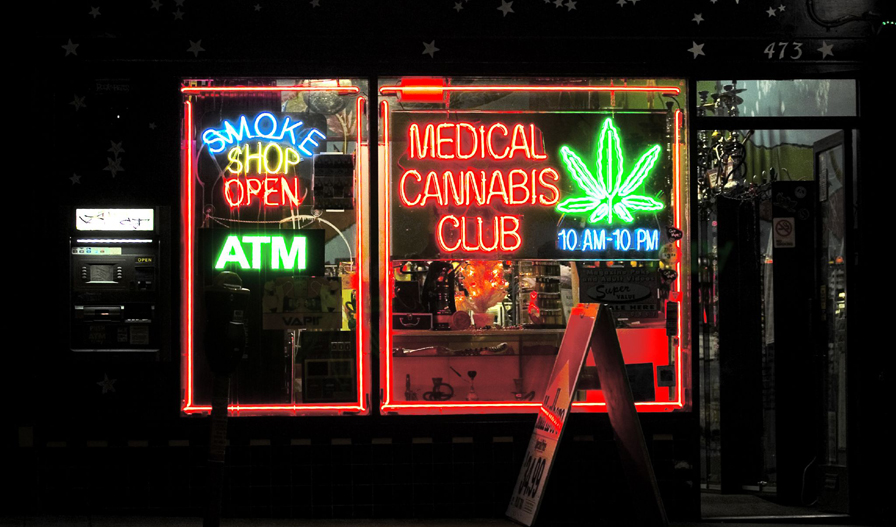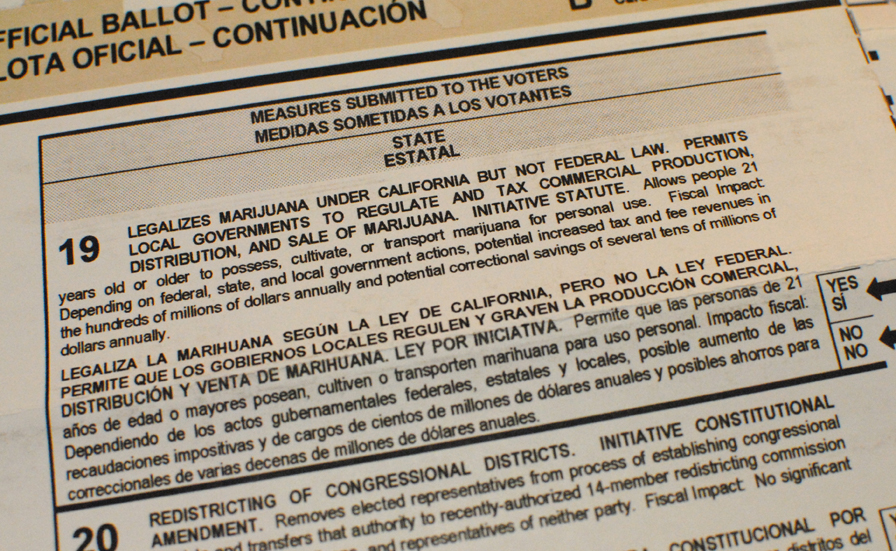 The Oakland Museum of California will hold the first-ever museum exhibition on marijuana in CA this April. The exhibition will be on view in the Museum’s Great Hall April 16 through September 25, 2016. It’s called Altered State: Marijuana in California and made possible in part by generous support from the Oakland Museum Women’s Board. They tell us that the special exhibition will present multiple perspectives on our favorite plant and also provide some opportunities for the public to get involved in the legalization conversation.
The Oakland Museum of California will hold the first-ever museum exhibition on marijuana in CA this April. The exhibition will be on view in the Museum’s Great Hall April 16 through September 25, 2016. It’s called Altered State: Marijuana in California and made possible in part by generous support from the Oakland Museum Women’s Board. They tell us that the special exhibition will present multiple perspectives on our favorite plant and also provide some opportunities for the public to get involved in the legalization conversation.
SPECIAL 4/20 EVENT
To celebrate the HIGH holiday on Wednesday, April 20, 2016, OMCA admission will be reduced to $4.20! They say it’s in recognition of the “counterculture holiday” observance of 4/20. And that while there are many opportunities outside of the Museum to celebrate on April 20, OMCA invites the public on this day and throughout the exhibition to engage in the discussion around marijuana that Altered State presents.
From the Oakland Museum:
In a groundbreaking exhibition rich with opportunities for public input and dialogue about the uses and evolving attitudes about marijuana, the Oakland Museum of California (OMCA) will open Altered State: Marijuana in California, the first-ever museum exhibition to focus on the topic, April 16, 2016, in its Great Hall. Set against the backdrop of a likely California ballot measure in 2016 to legalize marijuana’s recreational use, the exhibition features artwork, political documents and posters, scientific displays, and interactive and multimedia exhibits all meant to provoke questions and conversations about the provocative plant.Designed as a catalyst for conversation and reflection, the exhibition explores the many ways that people consider marijuana, including historical, social, and political perspectives, scientific data, and opinions of a diverse range of community members and groups. Organized into ten different areas of focus—Cannabis Science, Medical Marijuana, Profitable Pot, Sacred Ganja, Criminal Dope, Creative Grass, Evil Weed, Politically Loaded, Youth and Weed, and Recreational Reefer—Altered State will provide the opportunity for Museum visitors to add their voices to the evolving conversation.
“We have designed an open and participatory experience to engage anyone who has an opinion or wants to learn more about the complex issues and information about this topic, which is relevant to all Californians,” says Associate Curator of Natural Sciences
Dr. Sarah Seiter, who also curated OMCA’s popular exhibition Bees: Tiny Insect, Huge Impact. “We’re interested in presenting a forum for all sides of deep community conversations about marijuana, its history, politics, culture and impacts on our state.”Highlights of the exhibition include live and preserved specimens of cannabis on loan to the Museum, a walk-in installation by artist Cybele Lyle that alters viewers’ perspectives of space and time, a “Cannabis Confessional” that allows visitors to share their private, anonymous thoughts about marijuana, youth views about the topic, and explorations of the historical, social, political, and economic impacts that are changing the State. Content for the exhibition has been gathered from a wide range of sources, including science, government, growers, dispensaries and historical and social sources including media and popular culture.
“The roles of museums in today’s world are shifting,” says OMCA Director Lori Fogarty. “At OMCA, we aim to inspire Californians to create a more vibrant future for themselves and their communities. As part of this, we are dedicated to being a place where people can come learn about complex topics and, more importantly, add their voices and stories to the dialogue. This exhibition is proof of that in action.”
With marijuana increasingly in the news and as several states have recently legalized the recreational use of marijuana while many others are considering new medical and recreational legislation, the exhibition will be a timely opportunity to explore how people have constructed different perspectives and sets of values about marijuana over time, many of which are in conflict. These have been brought into sharper focus by recent and relevant discussions about the status of marijuana in California.
The Altered State exhibition is participatory and visitors will be active players in the evolution of conversation about the issues it explores. Through historical, scientific, social and personal stories, the exhibition will present ten ways that people consider cannabis in California. Each topic will be explored using the most current data, expert and community voices, historical and contemporary media and ephemera, interactives and prompts to stimulate conversation, and direct contributions from museum visitors.

RELATED: How to Pass a Saliva Drug Test
RELATED: How to Buy Marijuana Seeds Online Safely
The exhibition’s ten sections include:
Cannabis Science – The unique characteristics of cannabis are explored, including its three species, hundreds of man-made strains and scientific theories about why cannabis evolved to include cannabinoids including THC and CBD, chemical components that affect humans. Specimens-both living and preserved-will be presented in protective cases for visitors to get a closer look at cannabis plants.
Medical Marijuana – Is it a treatment, a cure, or a harmful substance? As marijuana gains increasing acceptance in medicine, visitors will learn what science knows about what it does to the brain and body and how government restrictions have limited how it is scientifically studied, giving an incomplete picture of its medical value.
Profitable Pot – California is the largest market producer and consumer of cannabis in the US. Economic and environmental opinions vary as to the impacts this cash crop creates. Visitors will explore these impacts and voice their opinions about the pros and cons and meet the people working in this of this growing cash crop and its surrounding industry.
Sacred Ganja – Some ancient cultures have used marijuana as part of ritual and shamanistic practices. Visitors will explore the spiritual history of cannabis, including how traditions such as Hinduism and Rastafari use it.
Criminal Dope – Although the US government classifies marijuana as a “hard drug”, laws controlling its use are applied differently in different jurisdictions and to different kinds of people. Visitors will explore how laws and their interpretation and application have developed over time and how they are affected by culture, geography, race and economics.
Creative Grass – Marijuana alters perceptions and some people find that it enhances creativity. In addition to delving into the science and personal opinions about marijuana’s ability to enhance or hinder cognitive and creative thinking, this section will feature a walk-in art installation by Cybele Lyle that demonstrates altered perceptions of space and time.
Evil Weed – California was an early adopter of ideas about marijuana, from criminalization to legalization. Californians’ beliefs about marijuana use and users have been the result of generations of social concerns about deviance, social change, personal freedom, and the role of authority. As a result, stereotypes about marijuana users have changed over time. Visitors will view dramatic images from American cultural history, including newspapers, pulp novels, quotations and photographs that convey differing emotions, viewpoints and values over time.
Politically Loaded – Although Californians has been engaged in a thorough discussion of putting legalization of marijuana on the ballot, there are many complex issues that demonstrate that the decision is far from cut-and-dried. Visitors will participate in a dialog about these complex issues with a range of experts, consider possible post-election scenarios that may result from various legalization and regulatory models and how these may affect Californians’ daily lives.
Youth and Marijuana – Created in collaboration with local youth who do anti-drug education and youth drug and culture experts, this section explores youth perspectives about marijuana and examines education and awareness practices of the past, both effective and not, including PSA’s that illustrate social concerns about youth and the risks of drug use.
Recreational Reefer – Californians have a range of feelings and opinions about recreational use of marijuana. Exhibition visitors will learn about how marijuana popular culture has changed over the decades, and can secretly and anonymously share their feelings about marijuana.
Interested in attending? Let us know in the comments below…
Leave a Reply